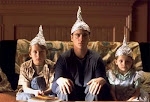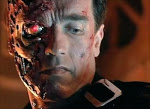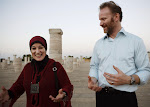In A Charlie Brown Christmas, the Peanuts gang gives Charlie Brown a special assignment: Go buy a big, pink, shiny, aluminum Christmas tree for their Christmas play. So Charlie Brown and Linus set out for the tree lot, where they wade through a myriad of gaudy, metal trees to find the only natural tree in the lot, which happens to be pitifully scrawny and prone to dropping the few pine needles still clinging to it. Thus, upon his return, the children berate Charlie Brown for his choice. This inspires him to cry out in desperation, "Isn't there anyone who knows what Christmas is all about?"
Linus responds, "Sure Charlie Brown, I can tell you what Christmas is all about." He then steps out on stage where everyone can see and hear him and starts quoting Luke's Gospel (2:8-14) "And there were in the same country shepherds abiding in the field, keeping watch over their flock by night. And, lo, the angel of the Lord came upon them, and the glory of the Lord shone round about them: and they were sore afraid. And the angel said unto them, Fear not: for, behold, I bring you good tidings of great joy, which shall be to all people. For unto you is born this day in the city of David a Saviour, which is Christ the Lord. And this shall be a sign unto you; Ye shall find the babe wrapped in swaddling clothes, lying in a manger. And suddenly there was with the angel a multitude of the heavenly host praising God, and saying, Glory to God in the highest, and on earth peace, good will toward men."
The children stand speechless. Charlie Brown, with a renewed spirit, leaves the auditorium by himself, taking his little tree with him. Approaching Snoopy's flashy, decorated doghouse, he decides to borrow an ornament for his tree. But the tree bends in half under the ornament's wait. Charlie Brown reacts saying, "I've killed it. Oh! Everything I touch gets ruined." Sulking away, he leaves the tree behind him, still bent to the ground. Then the other children enter the scene. Linus stands the tree upright, using his blanket to support its base. As one, the group transfers Snoopy's decorations onto the tree, transforming it into an attractive, confident looking Christmas tree. Soon thereafter Charlie Brown returns and sees his tree standing there, full and stately. The movie ends with all the children yelling, "Merry Christmas, Charlie Brown!" Then the credits roll as they chime in to sing "Hark! The Herald Angel Sing."
***
Notice the parallels between Charlie Brown's tree and the Christmas story Linus quotes from Luke's gospel:
--The little tree and the infant Jesus are so small and fragile that they cannot survive without the warmth and support of a simple blanket.
--The little tree and Christ's incarnation are easy to take for granted at first glance, but they represent a spark of genuine life amidst a distracted and inherently artificial world.
--Charlie Brown's tree was the only living tree in the entire lot, while Christ is the Fountainhead of Life for the entire lot of humanity.
--Both the tree and Jesus Christ endure humble beginnings, but their inherent beauty eventually becomes recognizable to average, naked eye.



















































